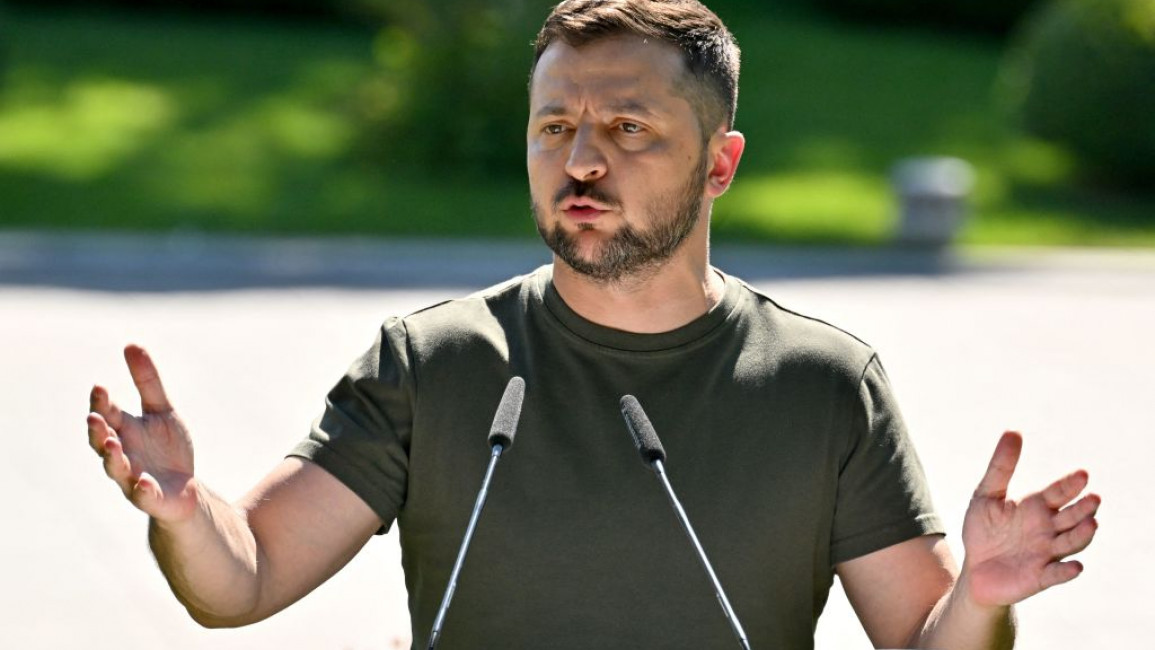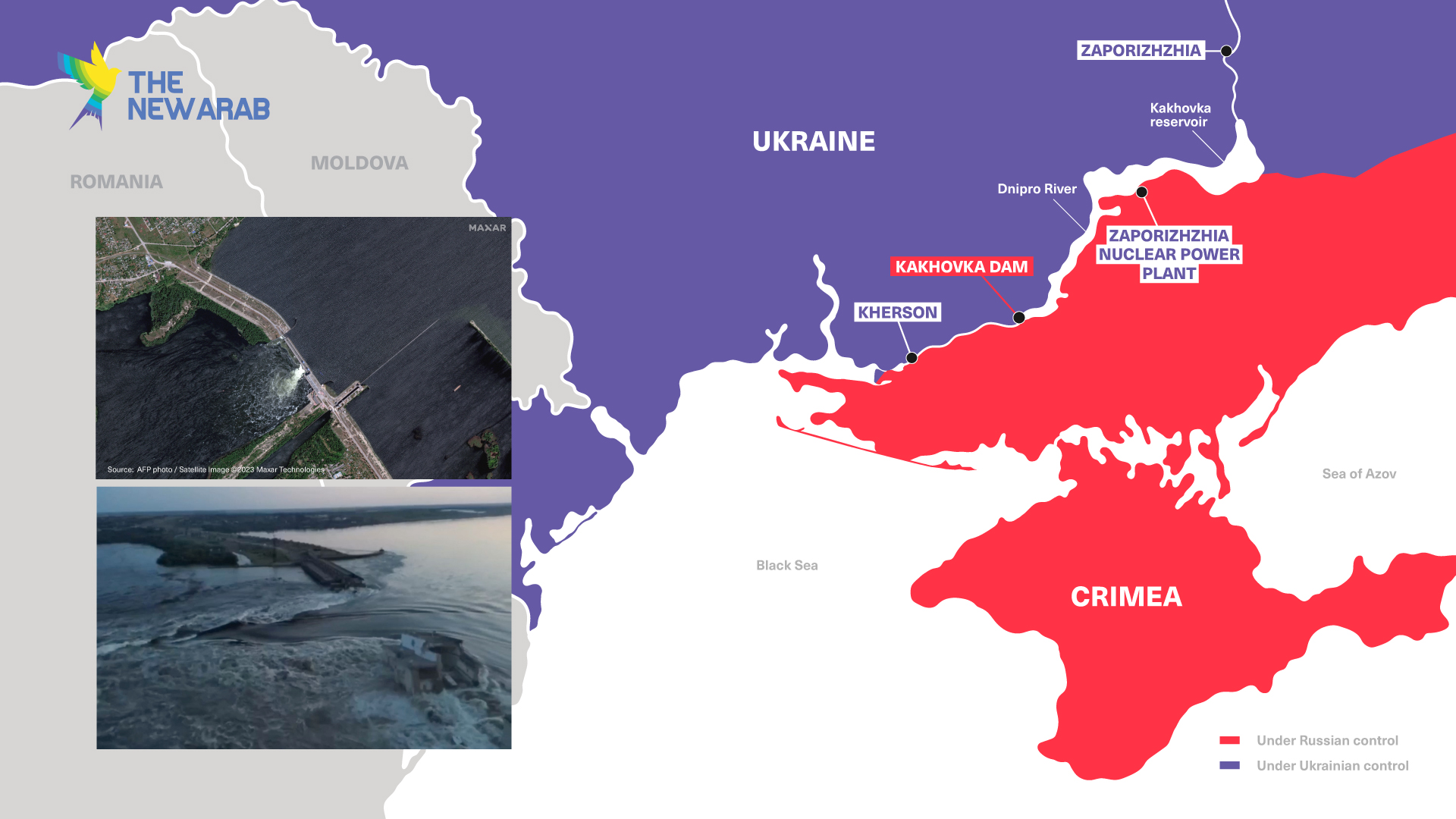Zelensky visits flood-hit Ukraine area as 5 killed after collapse of Kakhovka dam
Ukrainian President Volodymyr Zelensky visited the region flooded by the breached Kakhovka dam on Thursday, as Moscow-installed authorities said five people had been killed in the disaster.
The dam was breached on Tuesday, forcing thousands to flee their homes as water surged into the Dnipro River, flooding dozens of villages and parts of the regional capital Kherson and sparking fears of a humanitarian disaster.
Ukraine and Russia have accused each other of causing the breach, which on Thursday had left 600 square kilometres underwater, according to a regional governor.
Zelensky posted videos on Thursday showing him meeting officials in the Kherson region, as well as footage of people being evacuated at a crossing point.
"I thank the rescuers and volunteers! I thank everyone involved in this work!" he wrote.
Rescuers were using boats and amphibious vehicles to pluck people from flooded areas.
One woman, Tetiana Omelchenko, 65, said she had waited two days for evacuation from her block of flats and had to climb through a broken window to reach a rescue boat.
"In my building, the water has reached the third floor and there are still people in there," she said.
An employee at Kherson's meteorological agency, Lora Musiyan, waded into the water to mark the current level: 5.33 metres above the norm.
"That's the height of two storeys - you can only survive this on a roof," she said.
Musiyan said the level of water "has started falling slightly. If this trend continues, that will be good news for residents."
Officials said 2,629 houses were flooded in the Ukrainian-controlled area.
Some residents pleaded with rescuers to go back to flats to rescue pets left behind.
"My cat has been in the flat for three days without food, she's dying," said Olena, 59, covering her face with her hands. But her block of flats is in an area where the current is too strong for the rescuers' motor boats.
Ukrainian authorities have said 30 settlements have been flooded, 10 of which lie in territory controlled by Russia on the Dnipro's eastern bank.
A total of 600 square kilometres (230 square miles) of the Kherson region is underwater, governor Oleksandr Prokudin said on social media, 68 percent of which is in Russian-controlled territory.
"Despite the danger and heavy Russian shelling, the evacuation from the flooded area continues," the governor said.
The Moscow-backed administration of Nova Kakhovka, where the dam is located, said on social media: "Five people have died as a result of the Kakhovka hydroelectric power station disaster. 41 people are in hospital".
Ukraine has so far not given any figure on casualties, with Zelensky saying only that "people and animals have died" in the disaster.
Water levels have also risen by almost a metre in the city of Mykolaiv in the bordering region, its mayor, Oleksandr Sienkevych, said.
Ukraine and Russia have said that they have evacuated more than 6,000 people in total and many more were fleeing by themselves.
Zelensky singled out the United Nations and Red Cross for criticism in an interview with Germany's Bild daily, saying he was "in shock" because "they are not there".
NATO Secretary General Jens Stoltenberg said he would chair a meeting Thursday of an emergency coordination panel on the "outrageous destruction", with Ukraine's foreign minister Dmytro Kuleba set to participate.
France has also said it will send aid to Ukraine.
The Kakhovka dam provided cooling water for Europe's largest nuclear plant, Zaporizhzhia, which is under Russian control. The UN nuclear watchdog, the International Atomic Energy Agency, has said there was "no short-term risk" to the plant.
The dam's reservoir level has fallen by a metre in the last day as water drains out.
Ukraine accuses Russia, whose forces control the dam area, of blowing up the dam, while Russia accuses Ukraine hitting it with artillery.
Ukraine's Ukrhydroenergo, which manages hydroelectric plants, said that the dam was most likely mined from the inside.
The Soviet-era dam was "designed and built to withstand a nuclear strike from the outside," it said.
The emergency service has warned the flood water has dislodged land mines that pose a threat to civilians.
The government has also sounded the alarm over the environmental impact, calling it "a crime of ecocide".
A Greenpeace campaigner in Kyiv, Denys Tsutsaiev, warned that it could take a decade for some species to recover from the catastrophe and some may not recover at all.
According to the latest information, "at least 500 tonnes of oil was released due to the dam destruction," the campaigner said, posing a threat to sea mammals and birds.



![President Pezeshkian has denounced Israel's attacks on Lebanon [Getty]](/sites/default/files/styles/image_684x385/public/2173482924.jpeg?h=a5f2f23a&itok=q3evVtko)



 Follow the Middle East's top stories in English at The New Arab on Google News
Follow the Middle East's top stories in English at The New Arab on Google News


